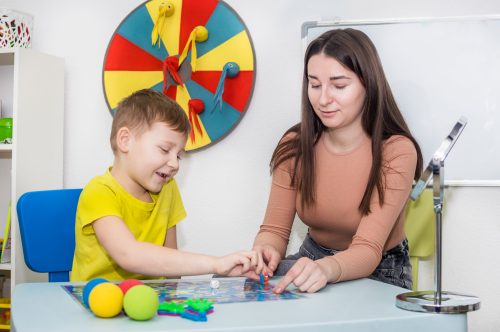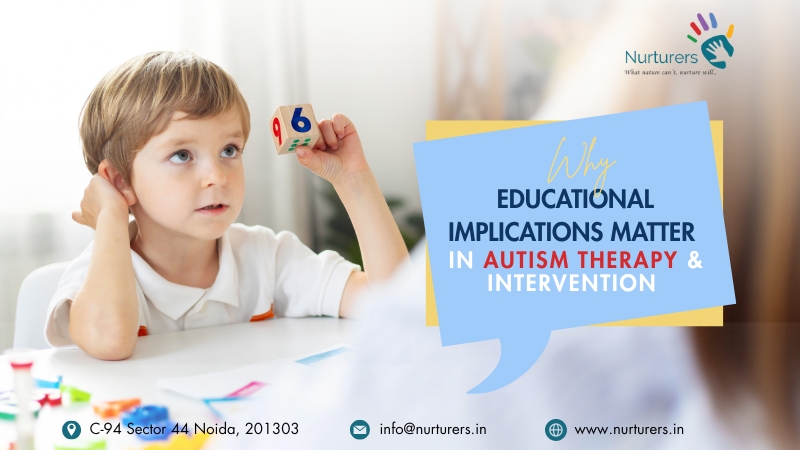Autism Spectrum Disorder (ASD) affects each child differently—shaping how they learn, communicate, and interact. At Nurturers, we know that therapy is most effective when it connects directly to the child’s everyday world, especially their educational environment. That’s where the idea of educational implications becomes essential.
Educational implications help us see beyond symptoms and diagnoses. They focus on understanding how autism specifically impacts a child’s ability to participate, learn, and succeed in school—including within special education settings—and how targeted therapy can bridge these gaps.
What Are Educational Implications in Autism?
Educational implications describe how a child’s unique challenges and strengths influence their experience in school and other learning environments.
For children with autism, educational implications may include:
- Difficulty understanding figurative language, leading to challenges in subjects like literature.
- Sensory sensitivities that make busy classrooms overwhelming.
- Struggles with executive functioning affecting organization and homework completion.
- Social communication differences make group activities or presentations stressful.
- Exceptional skills in certain areas (like math or art) that need enrichment.
By identifying these implications, therapists and educators can create personalized strategies that respect each child’s needs and strengths.

Bringing Educational Insights into Therapy
At Nurturers, therapy is never just about sessions behind closed doors—it’s about real-life application.
Speech therapy isn’t only about practicing words—it focuses on helping children participate in classroom discussions, ask questions, and collaborate on group projects.
Occupational therapy might include practicing using classroom tools (scissors, pencils) or building tolerance for classroom sensory experiences (like bell sounds or crowded hallways).
Behavioral therapy may help children learn coping strategies for stressful school events, like exams, changes in routine, or social conflicts.
By integrating educational goals into therapy, children can apply what they learn directly to their school lives, making progress more visible and meaningful.

Why Educational Implications Matter for Holistic Growth
School isn’t just about academics. It’s where children:
- Develop friendships and social confidence.
- Learn daily life skills, like following instructions and managing time.
- Practice problem-solving in real situations.
If therapy doesn’t address educational implications, there’s a risk that children will struggle in school despite progress in therapy rooms. But when therapy is aligned with educational realities:
- Academic engagement increases.
- Anxiety and behavioral challenges may reduce.
- Children feel understood and supported, boosting motivation and self-esteem.
This holistic growth benefits both short-term school success and long-term life skills.

Creating Individualized Educational Plans (IEPs)
Children with autism often thrive with personalized support plans, like IEPs or Individualized Education Programs. At Nurturers, we:
- Conduct comprehensive assessments to map each child’s strengths, challenges, and learning preferences.
- Work with educators to set realistic, measurable goals (e.g., improving attention span from 5 to 10 minutes).
- Recommend classroom accommodations, like extra time, sensory breaks, or visual supports.
- Adjust plans regularly based on the child’s progress and evolving needs.
This process ensures every child’s education journey is as inclusive, supportive, and empowering as possible.
Collaboration Is Key
Educational implications can’t be addressed by therapists alone. Real progress comes when therapists, educators, and families work as a team.
At Nurturers, we:
- Organize regular meetings with parents and teachers to share updates.
- Provide workshops for educators on autism-friendly strategies.
- Guide parents on reinforcing therapy goals at home—like encouraging daily reading or using social stories to prepare for new experiences.
- Create consistent routines between home, therapy, and school to reduce confusion and anxiety.
This shared responsibility ensures children feel supported wherever they are.

Beyond the Classroom: Lifelong Benefits
Considering educational implications isn’t just about doing better on tests. It helps children:
- Feel included and valued in peer groups.
- Build independence through life skills taught in school settings.
- Discover their unique strengths, interests, and career aspirations.
- Develop resilience and confidence for adulthood.
This holistic focus prepares children for life beyond school, making therapy an investment in their overall quality of life.
Conclusion: The Power of Educationally Informed Therapy
At Nurturers, we believe therapy should never exist in a vacuum. Understanding educational implications helps us tailor every intervention to real-world challenges and opportunities.
When therapy, education, and family support come together, every child has a stronger foundation to learn, grow, and thrive—not just as a student, but as a confident individual ready to navigate life’s journey.

